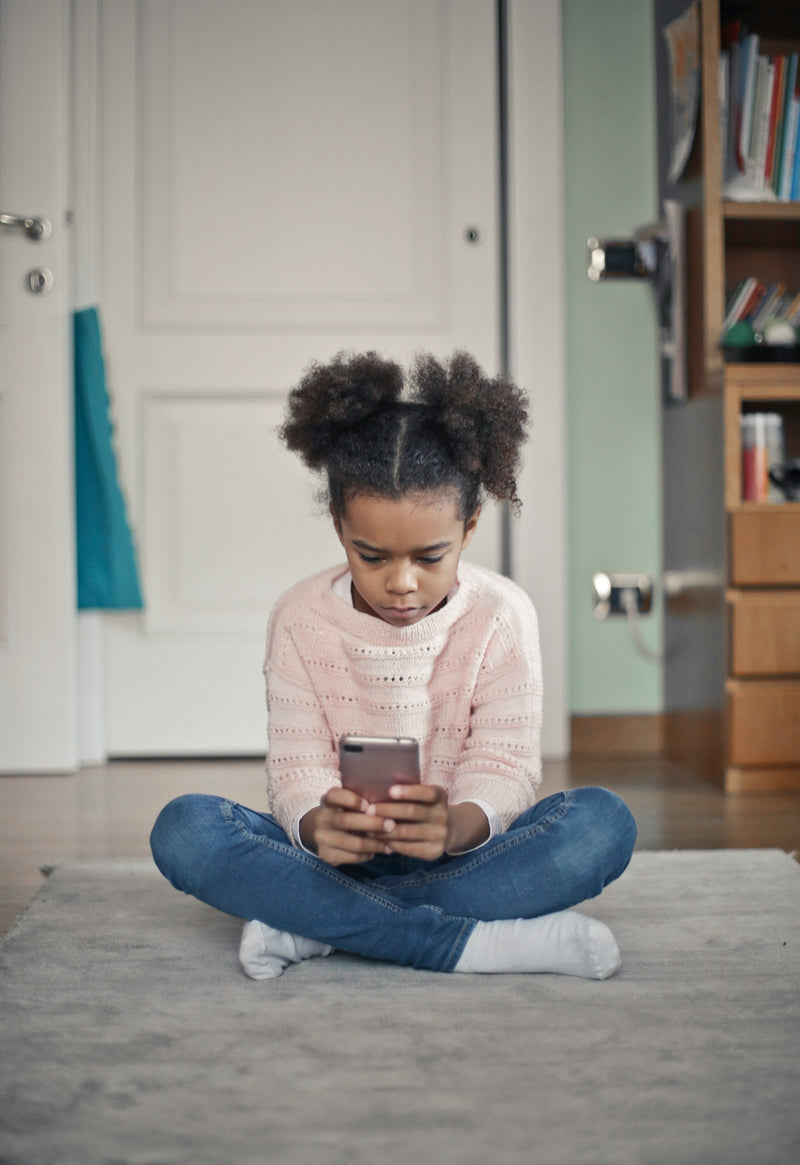
Digital Natives Need Digital Wisdom: Teaching Children Responsible Social Media Habits 📱✨
Picture this: Your eight-year-old comes home from school buzzing with excitement about a classmate's TikTok video that "went viral." They beg to create their own account, promising they'll "be super careful." Your heart sinks as you realize the digital world has arrived at your doorstep much sooner than expected. How do you navigate this brave new world where children are growing up as digital natives, yet still need guidance to become digitally wise? 🌐👧🏽
The Reality Check: Kids and Social Media Today 📊🔍
Let's start with the facts—social media isn't going anywhere, and children are encountering it earlier than ever. While most platforms officially require users to be 13 or older, research shows that many children create accounts or interact with social media content well before that age through family devices, older siblings, or friends.
This reality presents both opportunities and challenges:
The opportunities:
- Creative expression and digital storytelling skills 🎨📖
- Connection with friends and family, especially during times of distance 💕
- Access to educational content and diverse perspectives 📚🌍
- Development of digital literacy that will serve them throughout life 💻🧠
The challenges:
- Exposure to inappropriate content or online predators 🚨⚠️
- Cyberbullying and social comparison pressures 😢💔
- Privacy and digital footprint concerns 🔒👀
- Screen time and addiction potential 📱⏰
The Confident Mindset Journal can help children develop the self-awareness and confidence needed to navigate online interactions with integrity and wisdom. 📔✨
Building Digital Character: The Foundation of Responsible Social Media Use 🏗️💪🏾
Before children ever touch a device, we can lay the groundwork for responsible digital citizenship by focusing on character development in the real world. The values that guide good social media behavior are the same ones that create kind, thoughtful humans offline.
Core Values for Digital Citizens 🌟
Empathy and Kindness ❤️🤗 Teaching children to consider how their words and actions affect others translates directly to online behavior. The Kindness Mindset Journal helps children develop this essential foundation for positive online interactions.
Curiosity and Critical Thinking 🧐🔍 Children need to question what they see online and understand that not everything is true or appropriate. The Curiosity Mindset Journal nurtures the questioning spirit needed for media literacy.
Respect for Privacy and Boundaries 🔐🚪 Understanding personal boundaries and respecting others' privacy becomes crucial in digital spaces.
Responsibility and Accountability ⚖️🙋🏻♀️ Teaching children to own their actions and make amends when they make mistakes prepares them for the permanence of digital interactions.
Age-Appropriate Social Media Education: A Developmental Approach 📅🌱
Ages 4-7: Digital Foundation Building 🧱👶🏽
Focus Areas:
- Basic screen time awareness and balance ⏰⚖️
- Understanding that real people are behind digital content 👥💻
- Learning about private information vs. shareable information 🔒📢
- Practicing kindness in all interactions, digital or otherwise 💝🤝
Practical Activities:
- Create family media agreements with simple rules 📝👨👩👧👦
- Role-play scenarios about what to do if they see something that makes them uncomfortable 🎭🛡️
- Practice identifying "stranger danger" signs in digital contexts 🚨👀
- Use the Confident Mindset Journal to build self-awareness that supports good decision-making online 📔✨
Ages 8-11: Media Literacy and Critical Thinking 🧠🔍
Focus Areas:
- Understanding how algorithms work and why they see certain content 🤖📊
- Learning to identify reliable vs. unreliable information sources 📰✅
- Recognizing advertising and sponsored content 💰📢
- Understanding digital permanence ("the internet remembers") 💾🕰️
Practical Activities:
- Analyze advertisements together to identify persuasion techniques 🔍📺
- Practice fact-checking activities with age-appropriate topics ✅📚
- Discuss why some content might be fake or misleading 🚫📰
- Create family rules about sharing photos and personal information 📸🔒
The stories in the My Furry Soulmates series can provide conversation starters about friendship, conflict resolution, and character that translate beautifully to online relationships. 📚🦊
Ages 12+: Responsible Platform Engagement 📱🌐
Focus Areas:
- Understanding privacy settings and digital footprints 🔒👣
- Learning about cyberbullying prevention and response 🛡️💪🏾
- Developing healthy skepticism about online content 🤔❓
- Building skills for positive online community participation 🌟👥
Practical Activities:
- Review privacy settings together on any platforms they use 🔧🔒
- Discuss real examples of how online posts affected people's lives 📖💭
- Practice reporting inappropriate content or behavior 🚨📢
- Create positive content together that reflects their values ✨📱
The Great Social Media Conversation: Topics That Matter 💬🌟
Digital Footprints and Future Selves 👣🔮
Help children understand that what they post today might be seen by future teachers, employers, or college admissions officers. Make it concrete by asking: "Would you be comfortable if your grandmother saw this?" or "How might you feel about this post in five years?"
The Highlight Reel vs. Reality 📸🎭
Social media often shows only the best moments of people's lives. Children need to understand that comparing their everyday reality to others' carefully curated highlights isn't fair to themselves.
The Power of Words in Digital Spaces 💬⚡
Online communication lacks tone, facial expressions, and body language. Children need extra practice considering how their words might be interpreted by others.
When Things Go Wrong: Repair and Recovery 🛠️🌈
Mistakes will happen. Teaching children how to apologize, make amends, and learn from digital missteps is just as important as preventing them.
The Confident Mindset Journal provides prompts that help children reflect on their interactions and develop the self-awareness needed for positive online engagement. ✏️💭
Family Technology Agreements: Creating Structure and Safety 📋🏠
Rather than outright bans or unlimited access, many families find success with collaborative technology agreements that evolve as children mature:
Essential Elements to Include: 📝
- Specific time limits and device-free zones (meals, bedrooms, homework time) ⏰🚫
- Guidelines about what information can and cannot be shared online 🔒📢
- Procedures for reporting uncomfortable or inappropriate content 🚨📞
- Consequences for misuse that focus on learning rather than just punishment 📚⚖️
- Regular check-ins to discuss online experiences and adjust rules as needed 🗣️🔄
Sample Family Technology Agreement Elements: 📋
"We agree that technology is a tool to help us learn, create, and connect positively with others. We will treat people online the same way we would treat them in person. If we see something that makes us uncomfortable or confused, we will talk to a trusted adult immediately. We understand that our online actions represent our family values of kindness, respect, and responsibility." 💝👨👩👧👦
Red Flags: When to Seek Additional Support 🚩⚠️
Watch for these signs that a child might need extra guidance or professional support with social media use:
- Dramatic mood changes after device use 😢😡
- Secretive behavior about online activities 🤫👀
- Sleep disruption due to device use 😴📱
- Declining academic performance or loss of interest in offline activities 📚⬇️
- Mentions of online "friends" who want to meet in person 👥❓
- Evidence of cyberbullying (as victim or perpetrator) 💔🚨
Teaching Resilience for Digital Challenges 💪🏾🌈
Just as we prepare children for real-world challenges, we need to build their capacity to handle digital difficulties:
Cyberbullying Resilience 🛡️
- Teach children that bullying says more about the bully than the target 🎯💭
- Practice strategies for responding (don't engage, save evidence, report, seek support) 📋🆘
- Build offline confidence and friendships that provide emotional protection 💪🏾👫
Information Overwhelm Management 📊🧘♀️
- Teach children to take breaks when feeling overwhelmed by news or content 🛑💆♀️
- Help them curate feeds that inspire rather than discourage them ✨📱
- Model healthy skepticism about sensational or fear-based content 🤔🚫
Social Comparison Protection 📊💝
- Regularly discuss the difference between social media highlights and real life 🎭🏠
- Encourage children to focus on their own growth rather than comparison 🌱📈
- Use tools like the Confident Mindset Journal to build intrinsic confidence that's less vulnerable to online validation-seeking 📔💪🏾
The Positive Power of Social Media: Encouraging Good Digital Citizenship 🌟🤝
When used thoughtfully, social media can be a powerful force for good in children's lives:
Creative Expression and Skill Building 🎨📹
- Encourage children to create content that showcases their talents and interests ✨🎭
- Support them in learning digital skills like photography, video editing, or graphic design 📸🎬
- Help them find communities centered around positive interests and hobbies 🎸🏀
Connection and Community Building 👥💕
- Support appropriate connections with family members and close friends 👨👩👧👦💝
- Help them find age-appropriate groups focused on learning or positive activities 📚🌱
- Encourage them to use platforms to support causes they care about 🌍❤️
Digital Leadership Opportunities 👑🌟
- Encourage children to be positive role models online 💫🤗
- Support them in calling out inappropriate behavior (safely and appropriately) 🗣️⚖️
- Help them create content that uplifts and encourages others ✨📱
The Curiosity Mindset Journal can help children explore their interests and find positive communities online that align with their values. 🔍✨
Starting the Conversation Today: Practical First Steps 👣💬
Ready to begin building your family's approach to responsible social media use? Start with these actionable steps:
- Open the dialogue early - Begin age-appropriate conversations about digital citizenship before children have their own accounts 🗣️👶🏽
- Model positive digital behavior - Children learn more from what they see than what we say 📱👀
- Create technology-free family time - Regular offline connection strengthens relationships and perspective ⏰👨👩👧👦
- Stay curious rather than fearful - Approach technology with wonder and critical thinking rather than panic 🧐✨
- Establish regular check-ins - Make discussing online experiences as normal as talking about school or friends 📅💬
- Use journaling to process experiences - The Confident Mindset Journal helps children reflect on their digital interactions and build wisdom from their experiences 📝🌟
Building Future-Ready Digital Citizens 🚀🌍
When we invest in teaching children responsible social media habits, we're preparing them for a future where digital literacy will be as essential as traditional literacy. By combining character development with practical digital skills, we can raise children who are both digitally native and digitally wise.
Using resources like the Confident Mindset Journal, Curiosity Mindset Journal, Kindness Mindset Journal, and the character-building stories in the My Furry Soulmates series, we can provide children with the foundation they need to navigate the digital world with confidence, kindness, and wisdom. 📚🧱
Join Our Digital Parenting Conversation! 💬❤️
How are you approaching social media education with the children in your life? What strategies have worked well for your family? What challenges are you still navigating? Share your experiences in the comments below!
Remember: Teaching children responsible social media use isn't about restricting their future—it's about empowering them to create positive digital footprints that reflect their best selves. In a world where online and offline lives are increasingly intertwined, helping children develop digital wisdom alongside digital skills may be one of the most important gifts we can give them for their future success and happiness. ✨🌟



0 comments